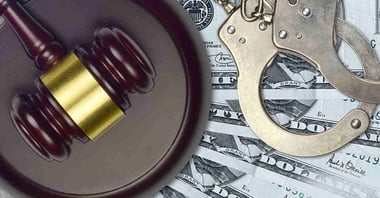The USA Patriot Act: Relevance of Section 314 in AML Compliance
The USA Patriot Act is one of the key anti-money laundering regulations in the US and it was passed shortly after the September 11, 2001, terrorist attacks. The act provides law enforcement agencies in the country with broader powers to investigate, indict, and bring terrorists to justice. It also brought in increased penalties for supporting terrorist crimes.
The USA Patriot Act of 2001 established enhanced law enforcement and money laundering prevention procedures so that the country can deter and punish terrorist attacks at home and abroad. It allowed the use of investigative tools designed for organised crime for terrorism investigations.
What is the USA Patriot Act?
The title USA Patriot is expanded as “Uniting and Strengthening America by Providing Appropriate Tools Required to Intercept and Obstruct Terrorism”. The Department of Justice drafted the original bill, to which the US Congress made sizable modifications and additions. The purpose of the Act is to enable law enforcement officials to track and punish those responsible for the attacks and to prevent any further similar attacks. Federal officials have the power to trace and intercept communications from terrorists for law enforcement and foreign intelligence purposes.
This Act targets financial crimes associated with terrorism and expands the scope of the BSA by giving law enforcement agencies additional surveillance and investigatory powers. The USA Patriot Act includes specific provisions and controls for cross-border transactions in order to combat international terrorism and financial crime.
Anti-money laundering laws and regulations are reinforced under the USA Patriot Act in order to deny terrorists the resources necessary for future attacks. Along with tightening the immigration laws to close borders to foreign terrorists, it also assures to put the rest in exile.
USA Patriot Act and AML
Under the USA Patriot Act, a number of anti-money laundering (AML) obligations were imposed:
- AML compliance programmes
- Customer identification programmes
- Monitoring, detecting, and filing reports of suspicious activity
- Due diligence on private banking accounts and foreign correspondent accounts, including prohibitions on transactions with foreign shell banks
- Mandatory information-sharing
- Compliance measures imposed to address particular AML concerns
Read More: The Role of US SEC in AML
Sections of the USA Patriot Act
Below is an overview of the sections of the USA PATRIOT Act that may affect financial institutions:
- Section 311: This Section allows for identifying customers using correspondent accounts, including obtaining information comparable to information obtained on domestic customers and prohibiting or imposing conditions on the opening or maintaining in the US of correspondent or payable-through accounts for a foreign banking institution.
- Section 312: This Section amends the Bank Secrecy Act by imposing & enhanced due diligence requirements on US financial institutions that maintain correspondent accounts for foreign financial institutions or private banking accounts for non-US persons.
- Section 313: Under this section, banks and broker-dealers are prohibited from having correspondent accounts for any foreign bank that does not have a physical presence in any country. Additionally, they are required to take reasonable steps to ensure their correspondent accounts are not used to indirectly provide correspondent services to such banks.
- Section 314: This section helps law enforcement identify, disrupt, and prevent terrorist acts and money laundering activities by encouraging further cooperation among law enforcement, regulators, and financial institutions to share information regarding those suspected of being involved in terrorism or money laundering. This has two parts:
- Section 314(a): This enables federal, state, local, and foreign (European Union) law enforcement agencies, through FinCEN, to reach out to more than 34,000 points of contact at more than 14,000 financial institutions to locate accounts and transactions of persons that may be involved in terrorism or money laundering.
- Section 314(b): This permits financial institutions, upon providing notice to the US Department of the Treasury, to share information with one another in order to identify and report to the federal government activities that may involve money laundering or terrorist activity.
- Section 319(b): It facilitates the government’s ability to seize illicit funds of individuals and entities located in foreign countries by authorising the Attorney General or the Secretary of the Treasury to issue a summons or subpoena to any foreign bank that maintains a correspondent account in the US for records related to such accounts, including records outside the US relating to the deposit of funds into the foreign bank.
- Section 325: It allows the Secretary of the Treasury to issue regulations governing maintenance of concentration accounts by financial institutions to ensure such accounts are not used to obscure the identity of the customer who is the direct or beneficial owner of the funds being moved through the account.
- Section 326: It prescribes regulations establishing minimum standards for financial institutions and their customers regarding the identity of a customer that shall apply with the opening of an account at the financial institution.
- Section 351: This section expands immunity from liability for reporting suspicious activities and expands prohibition against notification to individuals of SAR filing.
- Section 352: It requires financial institutions to establish anti-money laundering programmes, which at a minimum must include: the development of internal policies, procedures and controls; designation of a compliance officer; an ongoing employee training program; and an independent audit function to test programs.
- Section 356: It required the Secretary to consult with the Securities Exchange Commission and the Board of Governors of the Federal Reserve to publish proposed regulations in the Federal Register before January 1, 2002, requiring brokers and dealers registered with the Securities Exchange Commission to submit suspicious activity reports under the Bank Secrecy Act.
- Section 359: This amends the BSA definition of money transmitter to ensure that informal/underground banking systems are defined as financial institutions and are thus subject to the BSA.
- Section 362: It requires FinCEN to establish a highly secure network to facilitate and improve communication between FinCEN and financial institutions to enable financial institutions to file BSA reports electronically and permit FinCEN to provide financial institutions with alerts.
Section 314 of the USA Patriot Act
The USA Patriot Act is divided into various sections, which may affect financial institutions directly or indirectly. Section 314 of the USA Patriot Act, including both 314(a) and 314(b) is dedicated to preventing money laundering by both individuals and financial institutions. The objective of Section 314 of the USA Patriot Act is to detect and prevent suspicious terrorist activities. It is meant to encourage cooperation amongst law enforcement bodies, regulators, and financial organisations.
Section 314 (a)
The Financial Crimes Enforcement Network (FinCEN) which comes under the US Department of the Treasury encompasses the provision of Section 314(a). It achieves its objectives through encouraging the sharing of information between the above-mentioned financial institutions and others which may include inter-government bodies such as FATF and agencies that enforce the law.
The Secretary of the Treasury formulates and adopts the regulation which governs the sharing of information between the two parties mentioned above. This information which is shared covers individuals, entities, or organizations under observation for terrorist acts and money laundering. The information is used further by law enforcement agencies to gather further evidence, which is useful in prosecution. Section 314 and its extension, 314(a), have both enabled the nation and the rest of the world to achieve its main objective of deterring crime and more.
Section 314 (b)
Section 314 of the USA Patriot Act also includes Section 314(b), which is aimed at encouraging the sharing of information between financial entities voluntarily. Subsection 314(b) involves the sharing of information between similar entities, such as financial institutions while Section 314(a), involves common access and cooperation between the financial establishments and agencies that enforce the law.
While sharing of information is mandatory in Section 314(a) as stipulated in the federal laws, Section 314(b) is not mandatory or compulsory but rather voluntary. Despite that, the sharing of information under Section 314(b) is highly encouraged and recommended by FinCEN.
The purpose of sharing information is to increase the capacity of identification of any suspected money laundering activities in order to report it further for investigation. The section was provided by Congress for extra safety and to eliminate the risks associated with any liability on the consumer. It is beneficial to both customers or clients of the financial institutions because it eliminates liability for any violation of privacy or sharing any false information.
Another benefit of Section 314(b) to financial organizations is that it allows those who would like to share information freely with the rest to do so. It increases the capacity to deal with money laundering, terrorism, and related activities to promote mutual understanding and trust among the entities. Financial institutes will share a united and strengthened level of scrutiny of suspicious money wiring, transactions, and accounts.
AML compliance under the USA Patriot Act
The USA Patriot Act requires financial institutions to design their own Patriot Act compliance programmes to implement procedures to detect and report activity associated with money laundering. Money laundering detection procedures are important in order to avoid possible criminal liability. In addition, an anti-money laundering compliance programme will help avoid damage to a financial institution’s reputation if it is found to be laundering money that belonged to terrorists.
Under the Patriot Act compliance, the anti-money laundering program must also include a designated compliance officer who is a money laundering reporting officer (MLRO), an ongoing training programme, and an independent audit function.
Learn More: Layering in Money Laundering
The role of technology in AML compliance
Apart from necessary human resources, businesses should have technological resources to carry out their AML compliance measures.
There are modern software solutions based on artificial intelligence and machine learning that can manage the end-to-end of AML compliance programmes including transaction monitoring, screening and customer due diligence such as the Tookitaki Anti-Money Laundering Suite. Our solution can not only improve the efficiency of the AML compliance team but also ease internal and external reporting and audit with its unique Explainable AI framework.
Speak to one of our experts today to understand how our solutions help MLROs and their teams to effectively detect financial crime and ease reporting.
Anti-Financial Crime Compliance with Tookitaki?



